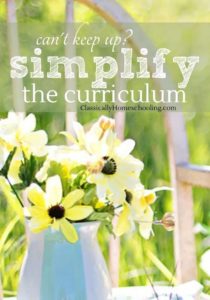Can’t Keep Up? 3 Ways to Simplify the Curriculum
This post may contain affiliate links. For more information, please read my disclosure policy.
Teach From Rest: Simplify the Curriculum
After hearing everyone raving about Teaching From Rest, I decided to check it out and ran across the post How to Simplify the Curriculum on Amongst Lovely Things.
WOW!
I have fallen in love. It describes the lessons I learned the hard way – through trial and error. This is the method of homeschooling I have been trying to attain and fearing I have failed.
You’ll likely hear me speak a lot about Teaching from Rest as Sarah MacKenzie speaks to my experience homeschooling. It’s like having all my hard knocks laid out and the solutions made clear. My curriculum will not be changing this next year, but I will be changing my approach slightly.
Right now, I’d like to ponder the concept of simplifying the curriculum as spoken of here.
Here Sarah lays out three points. Do less. Integrate. Understand the limitations of your curriculum.
She clearly read the Latin Centered Curriculum as I did. It changed me slightly, it changed Sarah more. She lays out a manageable way of doing simplifying the curriculum, one that I’d stumbled my way to over the years.
Do Less
Sarah speaks of doing fewer subjects to simplify the curriculum. We don’t need to do every subject every day. We don’t need grammar students doing reading, writing, grammar, spelling, phonics, vocabulary, penmanship, and copy work every day.
You’ll burn out. Your child will burn out. Instead, combine, go deep, and don’t try to cover everything perfectly all the time.
For me doing less has also come from watching so many homeschoolers add and add and add to their homeschool day. They add activity upon activity. After all, if one is good, 20 must be better.
Homeschoolers will add curriculum upon curriculum. It’s not uncommon to see people using 2 or 3 math programs, handfuls of language arts curricula, and tons of history and science activities.
Folks, it’s not possible to do it all.
I don’t. I don’t even try.
Instead, I choose what we use carefully and for a reason. We use one math program, yes there are many wonderful programs, but the one I use (Saxon Math) works for my family.
I can adapt to my kids who struggle with math and my mathematically gifted children. We no longer use any other math program.
We’ve chosen to do very few activities in my household. There is church on Sundays, the library on Saturdays, and a weekly park group. My high school children do more, but they are old enough to handle the details themselves. My involvement is minimal, to their delight.
It keeps our life peaceful.
Integrate
Integrate children and integrate subjects to simplify the curriculum. This is one reason I use Tapestry of Grace. This one program uses history as the linchpin to study literature, fine art, geography, religion, and writing.
There’s no need for me to juggle six different subjects for six different children. That’s 36, yes 36, different curricula I would need to keep track of in my homeschool. It boggles the mind.
Instead, I have one curriculum which gives me a list of books for each child, famous people to know, timeline information, discussion questions, worksheets, and everything I need to teach all six children at their level.
It simplifies the many pieces I need to pull together in order to educate my children. We have time to spend on learning each subject well and have time left in the day for personal projects. The children and I are not putting our noses to the grindstone from 8 am to 8 pm in an effort to do it all.
This brings us to the last point of simplifying the curriculum, so you have time to enjoy the coffee.
Understanding the Limitations of Curriculum
No curriculum will do it all. You could have the best curriculum on the shelf, but if it’s not used it will do no good in your household. The curriculum also will not educate your children. That’s your job.
This is one reason I study the curricula I use in an effort to understand what the curricula designers had in mind. Time is spent every summer reviewing Marcia Summerville’s lectures on Tapestry of Grace, listening to Susan Wise Bauer speak on classical education, and reviewing IEW’s Teaching Writing with Structure and Style.
But even after studying my curriculum in order to best utilize it, the curriculum I use still have limitations. It does not discuss meaning with your children.
Even the best curriculum does not ask leading questions and watches your child squirm under the pressure. It does not correct the writing. Nor does it give editing advice.
That being said, there is also something to be said for children learning to study and learn from books. There is nothing wrong with children reading and contemplating concepts to be discussed later with you.
It’s merely that reading and contemplating do not replace discussion. Although discussions are best held after the child has the opportunity to read and contemplate.
Teaching from Rest goes on to speak of two more ways of simplifying the curriculum. It’s definitely a book to read, reread, and read some more. It’s caused me to rethink why I’m homeschooling, why I classically homeschool, and what I hope the children take away from my homeschool into their adult lives.
In the end, we’re not educating children for today, but adults for tomorrow.
Recommended Reading:










I love this.
I only have three (2nd, k, and toddler) but still need to keep things very simple. Our only activities (other than church) are in the summer. While we do school year around we do slow down or take time off to enjoy that.
I combine for everything possible but I am not sure what things will look like the next few years with everyone needing their own math and language arts! And probably latin too?
Have you written anything on teaching independence as they age? I would love to hear more about how your high schoolers handle their own extracurriculars as well- and how did you transition to that? It’s a great idea.
It sounds like you have a lovely homeschool routine, Jerilyn. 🙂 Thanks for the ideas for future posts. I’ll definitely write about teaching independence in the next month or two. 🙂
Great post! I’ve just completed homeschooling my kids this past year. Sounds like you’ve got everything planned very well! Hope you have a great year! Thanks for sharing at Together on Tuesdays, too 🙂
Thank you for dropping by, Lisa. 🙂
This is great advice…. I find it too easy to keep adding….there is SO much we could learn… it is fun…and does get overwhelming at times… limiting is wonderful and I have had to learn to do that… Thank you for the article. 🙂
It so easy to keep adding. I still struggle not to just add one more book to our school day. 🙂
Great post! Such an important topic. Sometimes I find myself holding our kids back a bit (“But why can’t we do mapwork today? I love mapwork!”) but I think their free play, free reading, and just relaxing time is important too. (Even though part of me really wishes we could cover EVERY subject every day. There’s just so much to know!)
Free play and relaxing is so important. That’s the time when my older children developed their interests and gained better ideas of what they wanted to do with their life. None of them found their particular interests doing schoolwork. 🙂
Yes, I have struggled with this every year for almost two decades of homeschooling. I wish I had read it years ago, but even now it is a good reminder. Thanks!
Thanks for dropping by, Annie Kate. 🙂
We integrate some of our subjects. For example, for my first grader, I have her do some form of writing each day. But that may come with her history lesson on one day, it may be part of her grammar lesson on another day, or it may be a copywork exercise. It’s actually quite the same with my oldest. While she is working through the Writing with Skill series, her essays/compositions are integrated into her other subjects.
Doing less also resonates with me a lot. I think that I tend to agree that it’s better to do less and go deeper than to try to do lots.
Thanks for a great post!
Integrating can work very well, especially with writing. I’ve found it easier to simply have the children write about various subjects than add another curriculum to the pile. 🙂
I’ve just started my 19th year of homeschooling and I can attest to the truth shared in this article! Thanks for linking up with us at Coffee and Conversation. 🙂
~Candy
Thanks for dropping by, Candy. 🙂
I love how the classical movement seems to be shifting =) Obviously this topic is something that is on the forefront of my mind these days as well. I look forward to see how we all do this year with this new perspective! Thanks for sharing your thoughts!
The classical movement is shifting again. It seems to shift every few years, often for the better as people become more comfortable with classical education. It will be fun to see how everyone’s homeschool progresses over the school year! 🙂
These are great tips! I wanted to homeschool my children, and I was homeschooled for awhile myself, so I’ve studied a lot in school about education. I especially love what you say about not having so many subjects, they can quickly take over and it’s not fun for the students. Some programs can incorporate multiple subjects but you’re right, they can’t teach everything. 🙂
Thank you for linking up again with the SHINE Blog Hop this week!
Subjects taking over the homeschool isn’t fun for the parents either. There’s suddenly no time to relax, chat, and enjoy being a family. 🙂
Your insights are right on! After 18 years of homeschooling, we still sometimes struggle with juggling it all, and I come back to the same conclusion each time: simplify! I’m a by-the-book kind of gal, but I have to constantly remind myself that what we need to do may not be what the books dictate, but rather what the needs of each child is. There is simple no way to do it all!
Thanks for sharing!
You’re right, there is no simple way to do it all. I don’t think it’s even possible! Instead we simply do the best we can for each of our children and aim for balance in our lives and homeschool. 🙂
Great information for homeschooling parents. I completely agree with your points. The goal of homeschooling is not to replicate the classroom — if so, why homeschool? Our family homeschooled for 8 years. Over time I too realized it is better to narrow the focus and go deep rather than shallow and wide.
I agree, it’s better to narrow the focus and go deep. It’s allowed my children to discover and develop personal areas of interest. 🙂
Wonderful suggestions! I find when I compartmentalize our studies, I get overwhelmed. We do so much better with a key focus that much of our studies stem from. I usually start with our science topic as a base and them integrate language arts, math, social studies and art into it. My daughter is in grade two, so this is easier with the younger grades than I imagine it would be with the older grades.
Thanks for sharing these suggestions (and for linking up to the #SHINEbloghop).
Wishing you a lovely weekend.
xoxo
We do better with a key focus as well, but history is our base rather than science. Thanks for dropping by, Jennifer. 🙂
Just have to give a shout out to Saxon. I struggled in math all the way through school until junior year of high school where they were using Saxon. My senior year I got an A in AP Calculus. No method works for everyone but I think the advantage of homeschooling from what I’ve seen my sister doing with her 3 kids, is that you aren’t just locked into whatever method the school is using if it isn’t working. Which it was clearly not for me, for a decade.
That is an incredible advantage homeschooling has, you’re not locked into any particular method if it’s not working.
We love Saxon Math also! 🙂
I could really use these ideas. My life is very disorganized chaos, so, these tips are very helpful.
I’m happy to hear these tips are helpful. 🙂
I certainly agree – do less and simplify what you do. So much easier to really enjoy things then.
It is easier and more enjoyable to be able to take our time, relax, and do it right! 🙂
HI! I am a total NEWBIE to the homeschooling situation and my son will be starting Kindergarten this Sept. and I am literally overwhelmed with choices! lol May I ask what “Classical Homeschooling” is? I am prayerfully pioneering my way through deciding which cirricula is best for what God wants us to do and my own child’s learning style, I am also struggling on how to pick when I do not know if each program is accredited through our state of Ca. I feel lost, any help anyone can give this Mama would be GREATLY appreciated. Thanks for this post. God Bless you and your family!-Jenny
CURRICULA* my bad lol
Hi Jenny and welcome to Classically Homeschooling! Here are some posts that will help to get you started: Basics of Classical Education and The Classical Kindergarten. The series I just finished on classical education might also be interesting to you.
As far as finding resources for CA, try googling “homeschool California”. There are several California state homeschool groups that can help to get you started. 🙂
Great points listed in blog!! Your words out of your experiences, loved to read.
Thank you, Ashley! I’m glad you enjoyed the post. 🙂
Hi Sarah,
Thank you for this post on simplicity; I couldn’t agree more. My own personal experience taught me that teaching from a place of rest is so much easier when you focus on skills mastery in the k-8 years instead of trying to finish all those 36 week prepackaged curricula. Like me, it sounds like you’ve also mellowed on the rigidity of teaching subjects in the early years.
I’m going to share this post with some bright moms whom I coach who are trying to let go of other people’s expectations, and simplify. 🙂
Fondly,
Diane
P.S. I’m so glad that I found you via Kathy Gossen, and I love the clean look of your blog…very appealing visually and contextually.
Thanks, Diane. It’s too easy to get drawn into the race of doing more and more and more, especially in the K-8 years. I’ve also found it necessary to err on the side of simplicity in high school as well. 🙂
Thank you for this… What a lovely reminder. We are Charlotte Mason mostly, but the same rules apply… I need to constantly remind myself to do less because “good” stuff just keeps getting piled on. And integration is a must, I believe, if you are homeschooling anything more than an only child.
There’s so much “good” stuff to add! It can easily take up an entire day and we still wouldn’t have it all done. 😉
I completely agree, integration is wonderful for homeschooling. Being able to watch documentaries and historical movies together is a blessing. 🙂
I’m still absorbing this. You mean I don’t have to send my 5 and 7 year olds to acting class, music lesson, two co-ops a week and a seasonal sport!!!??? Let the simplifying begin!!